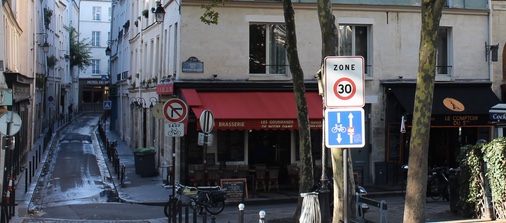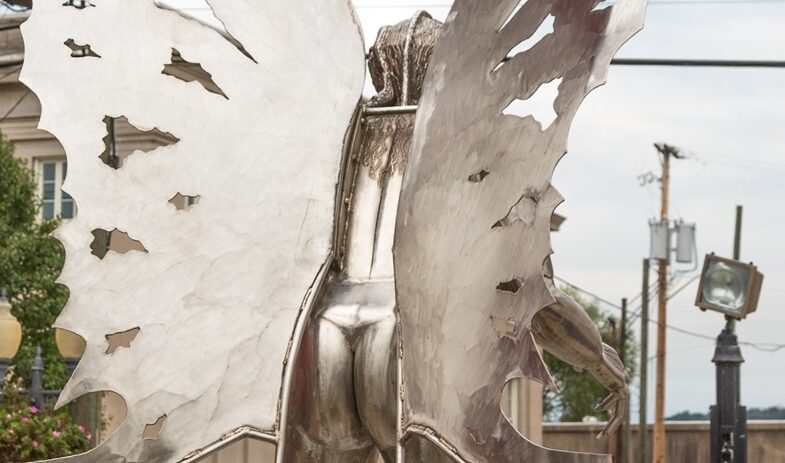He was a wizard that carried a sword, which marked him as a dangerous man. The Little Wyoming Casino had hosted some interesting conventions, though, so if someone had strode across the gambling floor dressed in a pointy hat and starred robe and it would have only drawn a few amused stares. This one, though, wore the regalia of a stage magician: a bright silk shirt matched the blue inner lining of his black cape; somber gray slacks ended in shoes so well shined they threw stars every time they emerged from his billowing shadow.
Claire noticed him from her table as he crossed the casino floor. At first she thought it was Henry, one of the house performers and one of a series of unfortunate recent choices she had made. She breathed a sigh of relief when she realized it wasn’t. Both the height and length of this one’s hair were too short to be Henry, the stature a bit elfin. This was a departure from the men Claire usually found attractive, but there was a devilish quality to the features enhanced by his beard and mustache.
His confident stride drew the attention of more than one admirer. It was this and the naked blade that the magician carried which drew Claire to the conclusion he must be a part of the entertainment. Perhaps, she hoped, he was a replacement for Henry. This wasn’t Vegas, though, and the Little Wyoming Casino only had so many places a magician should be headed and towards her table wasn’t one of them. Claire kept flopping the deal, though, certain if the purposeful stranger was walking around with a sword, security must have let them in.
Hers was a full table on a busy afternoon, dealing to five strangers, and everyone was enjoying themselves for a change. Everyone but the big winner in the center seat, which was strange, but sometimes gambling addicts didn’t muchenjoy their addiction, which made them a lot like drunks in Claire’s opinion. He sat hunched over the table, buried in a long brown coat, a wide-brimmed fishing hat squashed down over bristling, straw hair. He only spoke as necessary, preferring to signal his desires with scratching at the table. His voice had a hollow, droning quality that was unsettling, so Claire returned the favor.
The flamboyant appearance of the magician had gotten her attention but she needed to stay on the cards, on the players. She had made too many small mistakes lately and she needed this job. Out of her peripheral vision, though, she was only able to watch the sword conjuror as he approached the table, making a beeline for her winner.
Both men were odd, certainly, but Claire’s time at dealing cards had given her a rather long and extended acquaintance with the shortcomings and peculiarities of humanity. None of that, though, included violence.
There was a rustle from the other players at the table as they felt the magician’s blue and black cape fluttering behind them, sneaking looks over their shoulders, perhaps expecting a waitress or a gawker. Most did a double-take when they spotted the bearded magician, who only stared at the back of Claire’s winning player with an impish grin almost hidden by the mustache. Her winner only noticed something was wrong when Claire missed his signal for another card. He turned a pallid cheek to see what had her attention, just before the magician swiftly pointed the sword and plunged it into his back.
Claire gasped in surprise, her mind throwing up a shield of deniability, telling her this must be part of a spectacle, ordered up by the casino’s unpredictable and rarely seen boss. Whatever protective measure this thought offered, though, fell away to horror as the sword’s silver tip pierced her winner’s lapel, pinning him in place. The other playersstumbled away from their chairs in shock, the one in the cowboy hat unsurprisingly fumbling for a pistol under his jacket. Before he could draw or security could react, the winner, lanced through with the silver blade, arched his back, open mouth in a silent gasp towards the ceiling, and began to melt.
More than one person had lost consciousness at Claire’s table, but even the sudden onset of a blue-lipped fentanyl overdose was nothing like this. The winner’s hat fell away, followed by the straw of their wig. Under a slick pate, hisbeady eyes receded in their eye-sockets, until rubbery sludge rolled down its cheeks. It stood there, skewered on the sword, melting like one of the wax statues from the Ripley’s Believe It Or Not next door.
The real panic set in, though, at the appearance of the first bristling brown membrane that emerged from the oozethat was the winner. Like some sort of awful, fat wasp emerging from a cocoon, the first of the flyers peeked composite eyes and a brown chitinous shell out of the melting mass before the buzzing of its membranous wings appeared and carried it into the air. Then another, followed by another, emerged. The hall echoed with screams as players and employees added to the cacophony, knocking over furniture or anything else in between them and the exits. Claire stood at her table, transfixed by it all, caught between the shock of unbelievability and the terror that monstrous insects were circling her table.
The cowboy had managed to get his pistol out but only stared, eyes darting between the magician and the insect creatures, unsure who or what he should be shooting at. There wasn’t any hesitation from the magician, who withdrew the blade from the deflated skin of the gambler and began slicing and skewering the flying nightmares. Seeing this, the cowboy drew a bead on one of the buzzing flyers.
“Don’t!” the magician yelled in a voice that wasn’t as masculine as the beard, which was peeling off around the edges. Even at its higher pitch it held enough command that the cowboy stopped, having the good sense to point his pistol towards the ceiling and away from anything human.
The creatures didn’t follow the fleeing crowds or bother with the cowboy, but congregated around Claire like a bombinating tornado. One came buzzing towards her face, some part of her mind begging her to close her screaming mouth. It was halted by the silver flash of the magician’s blade, slicing it in half.
Beyond the flying horror, as it fell into two viscous pieces, Claire saw the magician had torn off their mustache and beard, revealing feminine features with a button nose. The stranger stared at her with startlingly violet eyes before winking at her.
For whatever reason, this allowed Claire to close her mouth. As she watched the stranger continue to swing and slice at the wasps, the air was filled with shrill, short bursts of noise that were quickly repeated. Each whistleaccompanied an arrow that skewered a bulbous insectoid, littering the floor around Claire’s table with shells that had all the charm of dead roaches. When one of the arrows buzzed close to the cowboy, he ducked down under the mundane threat of the barrage and wisely fled.
The arrows came from the bows of a man and woman, of equal height and similar stature. The arcane weaponry would have looked crafted for their hands except both of them were dressed in suits that looked more at place on Wall Street. With their sun-browned skin and raven black hair, they might have been brother and sister. This impression was only encouraged by their flanking a taller, heavier, older man, similarly garbed with his dark hair pulled back in a severe ponytail.
This was Chief Whatsit, a name no employee of the Little Wyoming would say to his face, but everyone used behind his back because so few were introduced to him and, of those, not one could remember it. As he stalked closer to the table, Claire thought, “Oh god, he’s going to fire me.”
The Chief, instead, approached the smiling, beardless magician, who wiped the gore from the blade onto what Claire was now certain was Henry’s cape. To Chief Whatsit, though, the imposter only said in a high if husky voice, “Hi Frank.”
The Chief frowned, clearly not happy at being address with such informality, even as the archers by his sides hid grins. Rather than address this, though, Frank replied, “Nice work, Aggie.”
With a flourish of the now gore spattered cape, Aggie took a melodramatic bow, her own dark bobbed bangs over her face. “My pleasure.”
With a cynical smile that couldn’t hide some warmth, Frank replied, “With the fee we’re paying you, I’m sure it is a pleasure.” He examined the floor, now covered with a dozen dead bulbous wasps that were already hollowing out. “Some day your gonna tell me how you figured this out when I couldn’t.”
“It’s not your fault, Frank,” Aggie said with a wide grin. “All white people look the same to you.”
To everyone’s surprise, except perhaps for Aggie, Frank (“Chief Frank” now forever in Claire’s mind) laughed out loud. She thought he might start back-slapping people when he stopped laughing altogether. He indicated the cowboy, who had been stopped at an exit by additional casino security, arguing with them as they relieved him of his pistol and prepared to escort him out. “That’s the kind of white people trouble we’re used to around here. How’d you do it?”
“You would have figured it out eventually, Frank. The magic is inside of you.”
Chief Frank’s heavy eyes settled on Aggie with a weight that could have curdled milk. “Fine, keep your secrets. Head to the cashier’s cage and they’ll pay you out.” He eyed the sword. “Where’d you get that thing?”
With a magician’s flourish, Aggie whipped the cape around, briefly obscuring her from view. When the fabric settled, both of Aggie’s hands were empty. “What thing?”
Chief Frank shook his head, then spoke to his escorts. “Don’t forget to pick up the arrows. We don’t want this waṡicu grabbing anything that she can walk off with.”
“Frank, now you’re just being nasty.” Claire could hear the mock hurt in Aggie’s voice, but lost sight of her as her knees finally gave and she sank behind her table. She didn’t really begin breathing again until she heard the heavy tread of Chief Frank move away.
Claire was still sitting on the floor, holding her knees to her chest, when the violet eyes of the stranger, almost covered by the dark hair of her long bangs, appeared over the lip of the table. “You OK?”
Claire felt shame heat her cheeks, hiding behind the table like a child. This Aggie person hopped over the table, the cape fluttering around like the wings of a magpie. She landed next to Claire, everything but her black hair, pale skin and violet eyes wrapped in the cloak’s outer dark. She flicked one of the chitinous shells away. “Pretty nasty, huh?”
Claire stared, trying to keep her eyes inside her head. “What was that?”
“It’s a goetic luck demon. But it’s gone now.” A small foot in a well-polished shoe swept out from under the cape to kick another bifurcated carapace away. “You’re safe.” Watching the dead thing tumble away didn’t free Claire from her fear, though, and she felt her breathing begin to intensify again.
Seeing this, Aggie spoke. “Can I tell you a secret?”
Claire blinked, trying to flutter the horror out of existence. “Sure.”
“This thing has been coming here for months.” Aggie indicated the casino with a swing of her head. “Frank couldn’t find it because he thought it was drawn to the casino. I found it because I figured out it had locked onto you.”
Claire’s eyes widened in horror as she heard this, watching one of the warriors bend down to collect an arrow from a pierced wasp, shaking its dust off. Aggie continued with, “You noticed, maybe the past few months, nothing quite works out for you? Particularly here at work? Maybe you’ve felt trapped, like you can’t do anything right.” Claire thought about the losing streak every table she dealt at had possessed, to the unfortunate choice of the love affair with the pompous Henry. “It’s ’cause of this thing.”
Claire felt a small, soft hand take her chin and guide her eyes to look into Aggie’s violet ones. “You’re free now, Claire. Go home, get some sleep. Wake up tomorrow and come to work. Or drive to Oregon. Go for a swim. Visit your mother. Do whatever you want. It can’t hurt you anymore. Whatever happens to you now…it’s just what happens.”
It was only then that Claire felt the sting of tears in her eyes. Looking at this odd stranger, she could only think to say, “Thank you.”
“Goodbye, Claire.” Aggie stood, seemingly much taller than before. “Good luck.”
























